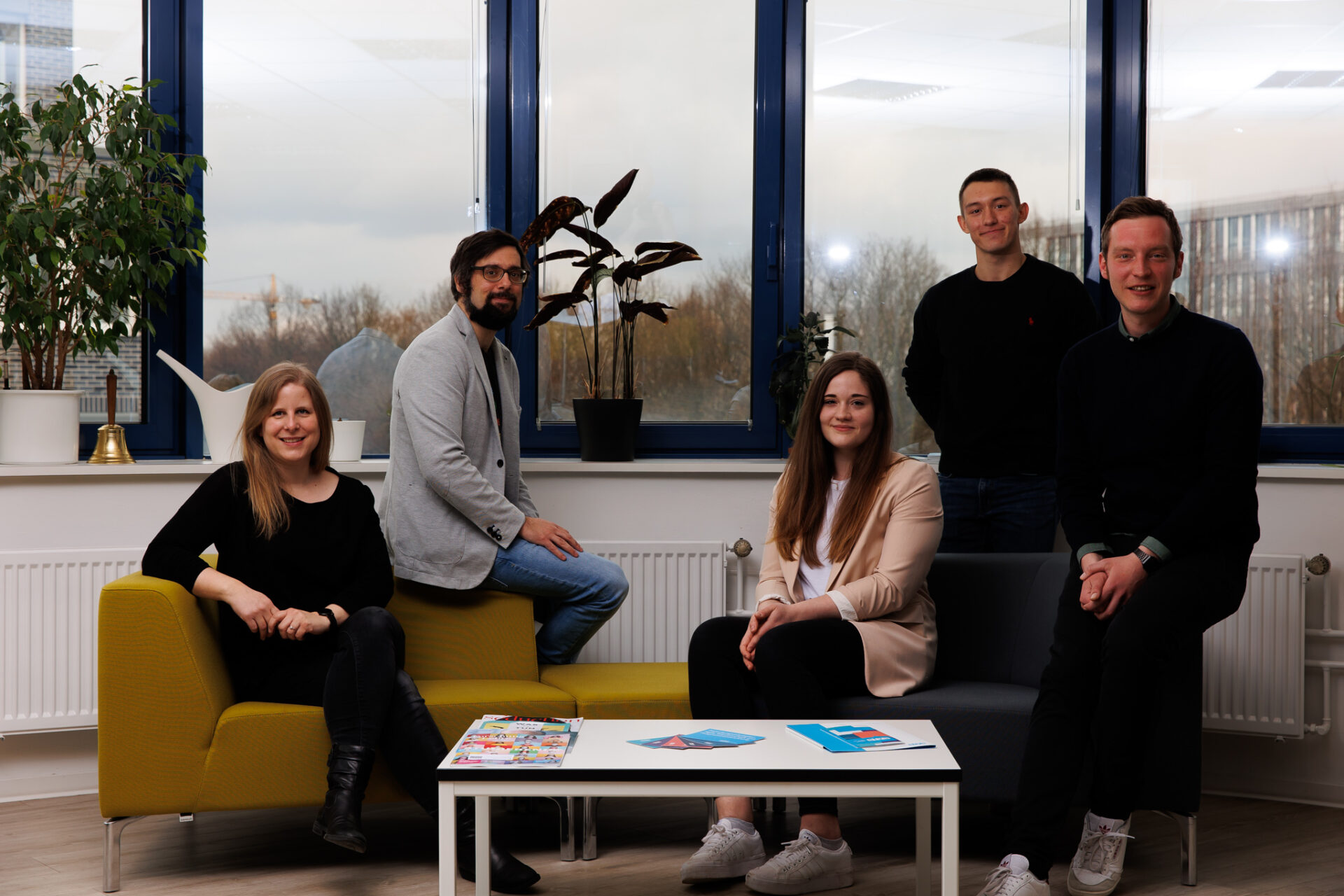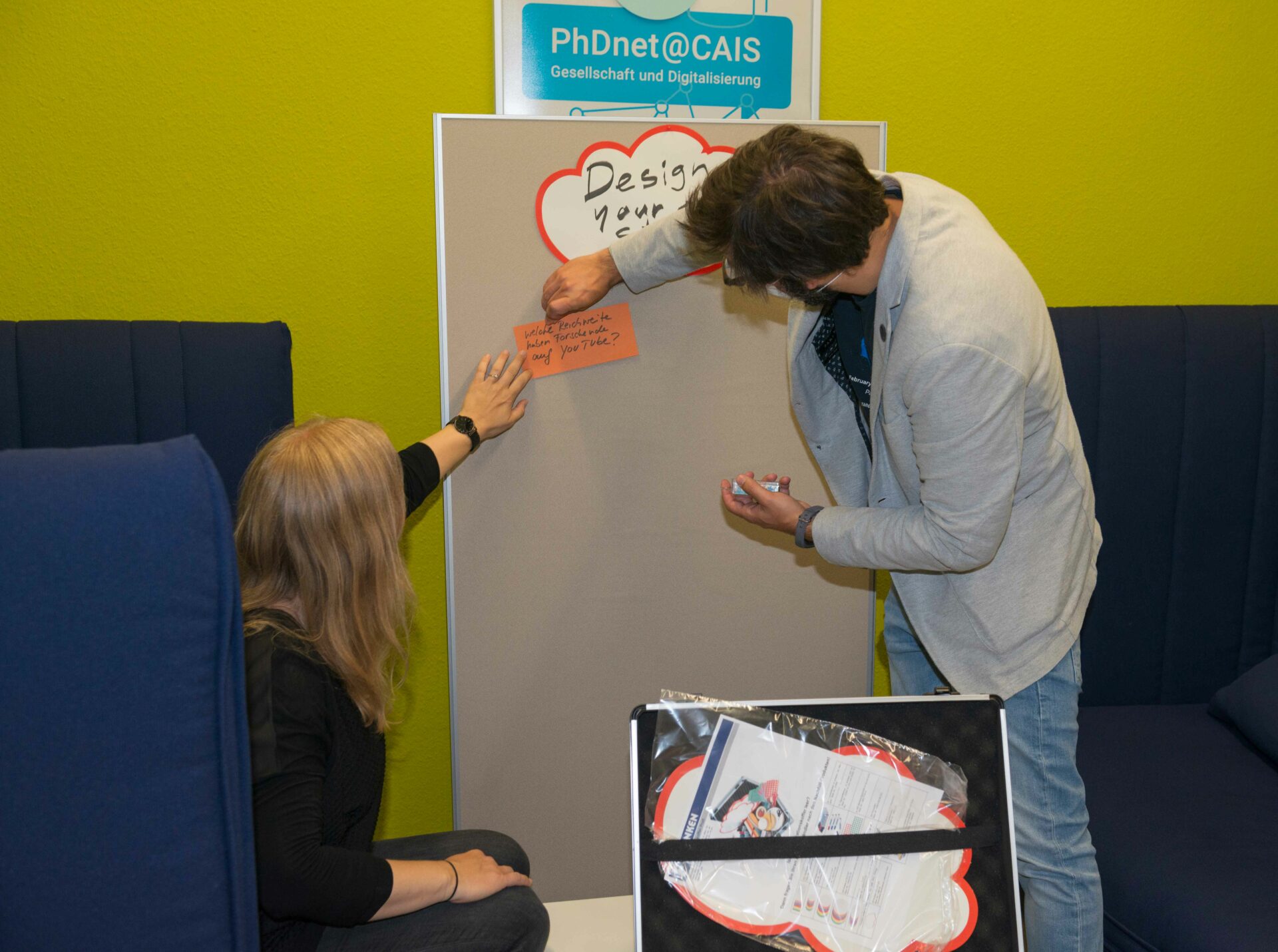RDM – Research Data & Methods

The Research Data & Methods team conducts interdisciplinary research on and with new types of data, such as digital traces from social media. With this expertise, the team creates consulting and training materials for researchers at CAIS on topics related to research methods, data, tools, and open science.

Study planning, data collection and analysis, but also the publication of results and the archiving of research data – all this is part of the process of typical empirical research projects. In the Research Data & Methods team, various resources are collected and created to support researchers at CAIS in each of these steps. Based on the needs of the researchers, information on methods, data and tools is compiled, consultations are held and training sessions are organized. A particular focus is on study planning and data collection as well as the publication of results and data.
read more
The members of the Research Data & Methods team use combinations of different methods for their own research work and, in addition to traditional data (e.g., from surveys or interviews), also use new types of data, such as network or trace data from social media. The team also conducts research on meta-scientific topics, such as theories and methods for dealing with digital behavioral data, open science, and the specific motivations, practices, and needs of researchers in the context of digitization research.
“We see ourselves as a guide for researchers at CAIS to find insights into innovative data types, adapted methods, or tools for new research approaches.”
Dr. Katrin Weller
Team Leader Research Data & Methods
Contact the Team
News
Second special issue of the transfer journal easy_social_sciences published
The second special issue of the transfer journal easy_social_sciences in collaboration with Julian Kohne (GESIS) and Johannes Breuer has been published.
University professorship for “Digital Social Sciences” and head of the “Research Data & Methods” team at CAIS
The University of Duisburg-Essen attaches particular importance to the quality of teaching. Didactic ideas on teaching – also taking into account the profile of the...
Series of Guides “Navigating Research Data and Methods”
“Navigating Research Data and Methods“ is a series of guides that provides short introductions and overviews of tools, methods, and other resources for digitalization research. The topics are aligned to the different phases of the Research Data Lifecycle: 1) Data Discovery, Study Planning & Design, 2) Data Acquisition, 3) Data Processing & Analysis, 4) Publishing, Archiving & Sharing.
Collecting Social Media Data
Tools for Obtaining Data from Social Media Platforms
#DataAcquisition
Social media platforms provide an internet-based form of communication for users to have conversations, share information, and create web content. The vast amounts of data produced by the increasing integration of social media into people‘s daily lives is not only of interest to platform providers, but also to researchers in various scientific fields of digitalization research.
- Stieglitz, S., Mirbabaie, M., Deubel, A., Braun, L. M., & Kissmer, T. (2023). The potential of digital nudging to bridge the gap between environmental attitude and behavior in the usage of smart home applications. International Journal of Information Management, 72, 102665.
- Breuer, J., Weller, K., & Kinder-Kurlanda, K. (2023). The Role of Participants in Online Privacy Research: Ethical and Practical Consideration. In S. Trepte & P. K. Masur (Eds.), The Routledge Handbook of Privacy and Social Media (pp. 314–323). Routledge.
- Munzert, S., Ramirez-Ruiz, S., Watteler, O., Breuer, J., Batzdorfer, V., Eder, C., … Yang, J. (2023, June 28). Publishing Combined Web Tracking and Survey Data. https://doi.org/10.31219/osf.io/y4v8z
- Bowman, N. D., Velez, J., Wulf, T., Breuer, J., Yoshimura, K., & Resignato, L. J. (2022). That bygone feeling: Controller ergonomics and nostalgia in video game play. Psychology of Popular Media. Advance online publication. https://doi.org/10.1037/ppm0000382
- Breuer, J., Kohne, J., & Mohseni, M. R. (2023). Using YouTube data for social science research. In J. Skopek (Ed.), Research Handbook on Digital Sociology (pp. 258–277). Edward Elgar.
- Breuer, J., Al Baghal, T., Sloan, L., Bishop, L., Kondyli, D., & Linardis, A. (2021). Informed consent for linking survey and social media data—Differences between platforms and data types. IASSIST Quarterly, 45(1), 1–27. https://doi.org/10.29173/iq988
- Breuer, J., Wulf, T., & Mohseni, M. R. (2020). New Formats, New Methods: Computational Approaches as a Way Forward for Media Entertainment Research. Media and Communication, 8(3), 147–152. https://doi.org/10.17645/mac.v8i3.3530
- Breuer, J., Bishop, L., & Kinder-Kurlanda, K. (2020). The practical and ethical challenges in acquiring and sharing digital trace data: Negotiating public-private partnerships. New Media & Society, 22(11), 2058–2080. https://doi.org/10.1177/1461444820924622
- Masch, L., Kieslich, K., Huseljić, K., Wähner, M., & Neef, J.-S. (2021). R – Ein Einführungsskript. Heinrich Heine University Düsseldorf. DOI: 10.24337/00001
- Mirbabaie, M., Bunker, D., Stieglitz, S., & Deubel, A. (2020). Who sets the tone? Determining the impact of convergence behaviour archetypes in social media crisis communication. Information Systems Frontiers, 22(2), 339-351. https://doi.org/10.1007/s10796-019-09917-x
- Mirbabaie, M., Bunker, D., Deubel, A., & Stieglitz, S. (2018). Examining convergence behaviour during crisis situations in social media-a case study on the manchester bombing 2017. In International Working Conference on Transfer and Diffusion of IT (pp. 60-75). Springer, Cham. https://doi.org/10.1007/978-3-030-04315-5_5
- Niederelz, C., Nguyen, P. , Wähner, M., Frieß, D., Becker, M., Braun, A. & Stodden, R. (2022). Die Corona-Pandemie als Katalysator der Verwaltungsdigitalisierung? Ergebnisse einer Befragungsstudie in Kommunalverwaltungen in NRW. Verwaltung & Management, 28(4), 186-192, https://doi.org/10.5771/0947-9856-2022-4-186
- Scharkow, M., Mangold, F., Stier, S., & Breuer, J. (2020). How social network sites and other online intermediaries increase exposure to news. Proceedings of the National Academy of Sciences, 117(6), 2761–2763. https://doi.org/10.1073/pnas.1918279117
- Schmitt, J. B., Breuer, J., & Wulf, T. (2021). From cognitive overload to digital detox: Psychological implications of telework during the COVID-19 pandemic. Computers in Human Behavior, Advance online publication. https://doi.org/10.1016/j.chb.2021.106899
- Stieglitz, S., Brachten, F., Braun, L.; Deubel, A.; Goldau, J., Fromm, J., Ross, B., & Priesmeyer, J. (2019). Twitter Communication and the 2019 European Parliament Election: Actors and Network Structures. https://www.uni-due.de/imperia/md/images/proko/twitter_communication_and_the_2019_european_parliament_election.pdf
- Stier, S., Breuer, J., Siegers, P., & Thorson, K. (2020). Integrating Survey Data and Digital Trace Data: Key Issues in Developing an Emerging Field. Social Science Computer Review, 38(5), 503–516. https://doi.org/10.1177/0894439319843669
- Wulf, T., Breuer, J., & Schmitt, J. B. (2021). Escaping the pandemic present: The relationship between nostalgic media use, escapism, and well-being during the COVID-19 pandem-ic. Psychology of Popular Media. Advance online publication. doi:10.1037/ppm0000357
Team RDM



